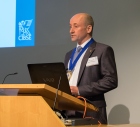Global challenges and solutions

Peter Kinsella, the new CIBSE president, believes that building-services engineers have a key role to play in solving the world’s energy and environmental problems.
CIBSE’s president for 2014/15 opened his presidential address last month with a torrid description of today’s world. ‘We live in a rapidly changing world, The climate is changing. People are living longer. World population is increasing. resources are coming under every-increasing pressure. Power prices are rising. And the world is shrinking.’
One is reminded of what is sometimes regarded as a Chinese curse ‘may you live in interesting times’. Peter Kinsella is, however, not deterred, for he then immediately added, ‘There has never been a better time to be a building services engineer!’
What he is so enthusiastic about is the need for and opportunity to improve the performance of buildings — both in terms of the internal environment they deliver and the amount of energy they use in so doing.
He warns that there are deceptive ideas on the way — especially greenwash — but is far more concerned that good engineering delivers what is needed and that lessons are learned from both good and bad experiences.
One of the key drivers for the need to improve the performance of buildings is the energy they use. Peter Kinsella said, ‘Buildings are responsible for approximately 40 to 45% of aggregate energy demand. Delivering significant cuts in this demand and balancing the environment imperatives will require very careful management.’
We appear to be facing a rapid decline in the production of oil, and, in the longer term, gas. He added, ‘Coal is still in abundance, but it comes with significant environmental consequences.
As for nuclear energy, he put forward the view that health-and-safety and waste-disposal issues make it a very difficult option to implement. Added to those problems is the weight of public opinion against nuclear energy.
As for other options, he commented, ‘Renewables currently only play a minor role in the provision of energy. However, this is growing and should be encouraged.’
With the future supply of energy being a major concern to many countries in the world, Peter Kinsella summarises, ‘What this very brief snapshot of energy supply tells us is that it will require acute and even visionary management both to encourage energy efficiency and to fully commercialise effective alternate sources of power, not only just to meet future demand but also to control and reduce the carbon emissions that threaten our very future.
‘I don’t pretend to have all the answers, but I do now that it will require a partnership between government, the community and relevant professionals, such as us, the world over.’
Using less energy in buildings is clearly a key factor, and he stressed that CIBSE has the knowledge to deliver significant improvements in energy performance without compromising building performance.
Note the present tense there, for he also stressed, ‘The urgency of acting on this now is that damage being done to the environment now is going to take many years to mitigate.’
But whatever is done now needs to be effective and remain effective in the long term — and that is where engineers have a key role to play. ‘Industry relies on engineers to provide a true and fair view of all aspects of engineering, so we need to maintain a balanced view, cutting through the hype that accompanies many products and systems, evaluating their worth and, even more importantly, where they are appropriate and where they are not.’
One ‘amazing’ idea he mentioned was using a fan to drive a wind turbine to give back ‘free’ energy. He asked, ‘How does anything like this get off the drawing board, let alone through the production and marketing stages?’
Buildings are long-lived objects. That means that most of the inefficiencies built into their design will be there for the rest of the building’s life. The need is to ensure that buildings continue to improve and to accelerate improvements in performance.
Learning from previous experience is an important part of improving future performance. In this context Peter Kinsella referred to a landmark building in Melbourne, Australia.
Known as Council House 2, or CH2, it was built about eight years ago and incorporated many tried-and-tested energy-saving initiatives. They included special provision for natural daylighting, the incorporation of usable thermal mass, a high-performance façade and the provision of shading.
Features that were less tried and tested were shower towers, black-water recovery, phase-change materials, micro-generation with an absorption chiller for cooling and wind turbines.

Peter Kinsella explained, ‘The project was used primarily as a demonstration of all things possible rather than practical. I am more than happy with that philosophy. I fact, I applaud those amongst us who are able and willing to experiment and to push the boundaries.’
The building has been monitored, and has not lived up to its aspirations. Lessons are being learned, and Peter Kinsella reports, ‘The building’s owners have always been open about the building’s successes and failures and are planning control changes and upgrades to improve its performance.’
The industry as a whole should follow that example, he argues. ‘It is critical that our profession ensures that the promised benefits of measures that we incorporate into a building’s performance are delivered. If for some reason they are not, then we must investigate the reasons why not and then share the lessons learnt so as to improve our collective knowledge base.
‘We have an obligation to ensure continual improvement and minimise the repetition of the same mistakes.’
Legislation has a key role to play in requiring buildings to become more efficient in their use of energy. However, Peter Kinsella is concerned that such measures should be clear, unambiguous and enforceable — and not left open for intentional or unintentional misinterpretation. He also stressed that mandatory efficiency measures need to be enforced and checked for compliance.
‘Some countries have several compliance checks, ‘ he said, ‘certifying the design, the installation and then, going forward, reviews of the existing buildings.’
And then some thoughts about how buildings are delivered and perform in practice.
One of his concerns is that ‘so many buildings are still being constructed with few, if any, passive measures to reduce heat loads’. His concern is that managing these loads will incur a cost, and almost certainly a rising cost, over the whole life of the building’.
Another observation demands attention: ‘We cannot continue to divorce design and construction from operation.’
Implications include design intent addressing the intended operational requirements.
Controls are another issue, and Peter Kinsella suggested that the complexity of a building’s services and its controls need to be appropriate to the building’s intended use and those who are likely to operate it.
Complex services and controls may be appropriate with a long-term client and a strong FM team. However, such complexity in a building with a substantial turnover of operators increases the chances of things going wrong and more energy being used that intended.
Two of Peter Kinsella’s goals for his presidential year are aimed at improving the design and operational performance of buildings.
One is to promote a feedback loop so that designers consult and listen to FMs. and FMs use the designers. He explains, ‘Designers need to know what works and what doesn’t work, and how the building is actually operated. The FM people need to know how the building was planned to work in the first place.’
Another goal is for more benchmarking of energy use in buildings to make it increasingly possible to accurately evaluate how a particular building performs in relation to similar buildings.
With such a huge need for the skills and expertise of building-services engineers, can anyone really dispute his closing — and opening — remark: ‘There has never been a better time to be a building-services engineer.’








